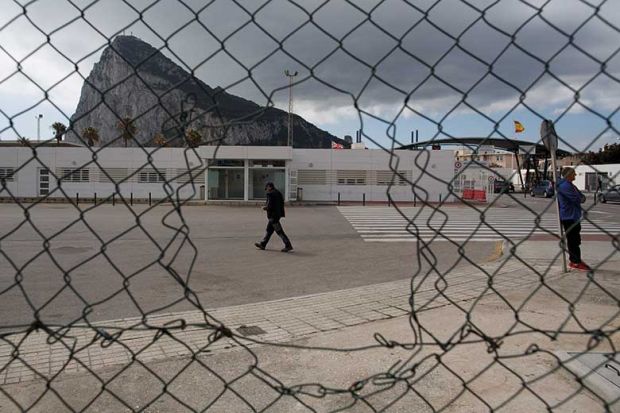The struggle to reconcile Brexit with avoiding a return to a hard border in Northern Ireland is a reminder of just how important the European Union has been in enabling the peace process. But much less attention has been paid to how Brexit will also imperil British territory that relies on free movement across a border: Gibraltar.
So the edited collection Bordering on Britishness could not be better timed. An output of a project funded by the Economic and Social Research Council, it draws on oral history interviews and archival research to try to understand what Britishness means in the territory. The book will make uncomfortable reading for those holding lazy stereotypes about Gibraltar as simply “Britain in the sun” (as an execrable Channel 5 documentary called it).
Gibraltar was initially a British fortress, wrested from Spain in the 1713 Treaty of Utrecht, and its original inhabitants left en masse to be replaced by a garrison. A civilian population grew up to service the military, drawn from across the Mediterranean: Jews, Maltese and Genoese. In time, this mixed population was to become a distinctive, multicultural society, one that the British authorities often viewed with ambivalence.
As this collection shows, Gibraltar cannot be understood outside the context of its hinterland, the Campo de Gibraltar, and the town of La Línea de la Concepciòn just over the border. One of the poorest regions of Spain, it became partially reliant on workers commuting daily across the border to its richer neighbour. Over time, cross-border families emerged, with Spanish being the majority language among Gibraltar’s residents. The British ruling class also traversed the border, riding with Spanish grandees in the Calpe Hunt and visiting the brothels in La Línea.
Yet in the post-war period, with the decline of the military presence and greater autonomy granted to the territory, Gibraltarian identity increasingly became predicated on not being Spanish. Franco’s closure of the border between 1969 and 1982 was traumatic and split cross-border families apart, resulting in an intense investment in the idea of British Gibraltarianness.
The current situation, as this collection indicates, resists easy summary. The EU ensures that the border cannot be closed (although Spain can make crossing a lengthy process) and Gibraltar and La Línea are dependent on each other. Gibraltar voted overwhelmingly for Remain. At the same time, the use of Spanish in the territory is declining and Gibraltar’s Britishness is constantly asserted. Still, the growing ubiquity of the Gibraltarian flag and football team is a marker of a kind of nationalism that is separate from British nationalism.
In his conclusion, Andrew Canessa poses the question of whether, in the face of the betrayal of Brexit, Gibraltarians, like Ulster Unionists, might reconsider their attachment to Britain. Indeed, he asks “what would happen to Gibraltarian Britishness were the economics of the relationship to change in the context of the very real possibility of relative economic decline in the UK compared to Spain in decades to come”. Gibraltar’s relationship to Britishness might well be transformed in the future, just as it has been transformed in the past.
Keith Kahn-Harris is a senior lecturer at Leo Baeck College, an associate lecturer at Birkbeck, University of London and a fellow of the Institute for Jewish Policy Research.
Bordering on Britishness: National Identity in Gibraltar from the Spanish Civil War to Brexit
Edited by Andrew Canessa
Palgrave Macmillan, 246pp, £89.99
ISBN 9783319993096
4 March 2019
Register to continue
Why register?
- Registration is free and only takes a moment
- Once registered, you can read 3 articles a month
- Sign up for our newsletter
Subscribe
Or subscribe for unlimited access to:
- Unlimited access to news, views, insights & reviews
- Digital editions
- Digital access to THE’s university and college rankings analysis
Already registered or a current subscriber?








